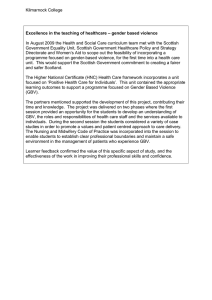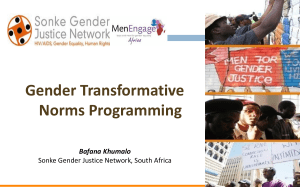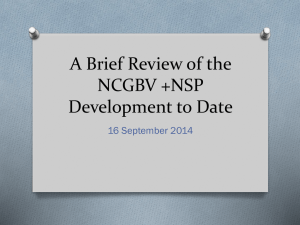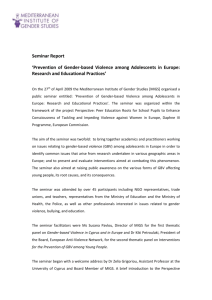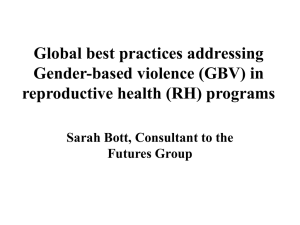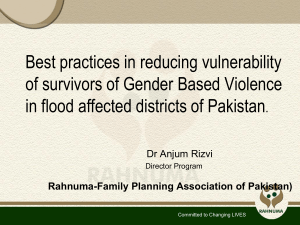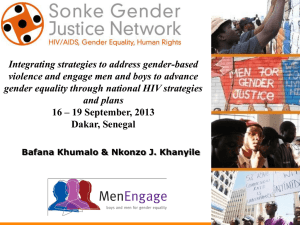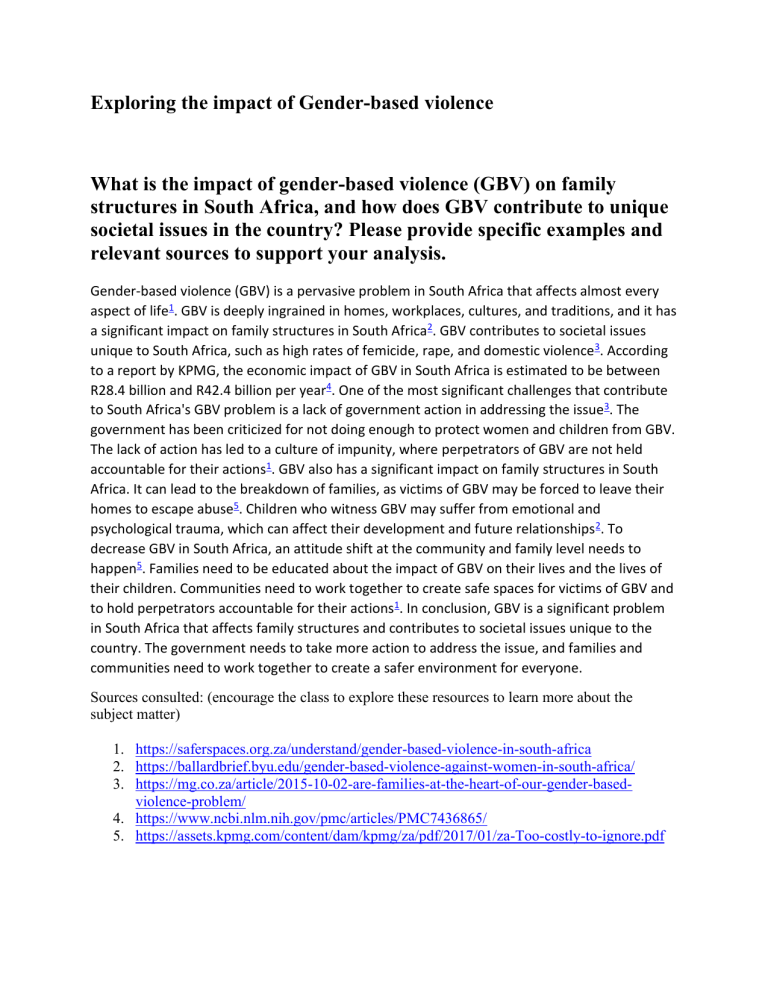
Exploring the impact of Gender-based violence What is the impact of gender-based violence (GBV) on family structures in South Africa, and how does GBV contribute to unique societal issues in the country? Please provide specific examples and relevant sources to support your analysis. Gender-based violence (GBV) is a pervasive problem in South Africa that affects almost every aspect of life1. GBV is deeply ingrained in homes, workplaces, cultures, and traditions, and it has a significant impact on family structures in South Africa2. GBV contributes to societal issues unique to South Africa, such as high rates of femicide, rape, and domestic violence 3. According to a report by KPMG, the economic impact of GBV in South Africa is estimated to be between R28.4 billion and R42.4 billion per year4. One of the most significant challenges that contribute to South Africa's GBV problem is a lack of government action in addressing the issue3. The government has been criticized for not doing enough to protect women and children from GBV. The lack of action has led to a culture of impunity, where perpetrators of GBV are not held accountable for their actions1. GBV also has a significant impact on family structures in South Africa. It can lead to the breakdown of families, as victims of GBV may be forced to leave their homes to escape abuse5. Children who witness GBV may suffer from emotional and psychological trauma, which can affect their development and future relationships 2. To decrease GBV in South Africa, an attitude shift at the community and family level needs to happen5. Families need to be educated about the impact of GBV on their lives and the lives of their children. Communities need to work together to create safe spaces for victims of GBV and to hold perpetrators accountable for their actions1. In conclusion, GBV is a significant problem in South Africa that affects family structures and contributes to societal issues unique to the country. The government needs to take more action to address the issue, and families and communities need to work together to create a safer environment for everyone. Sources consulted: (encourage the class to explore these resources to learn more about the subject matter) 1. https://saferspaces.org.za/understand/gender-based-violence-in-south-africa 2. https://ballardbrief.byu.edu/gender-based-violence-against-women-in-south-africa/ 3. https://mg.co.za/article/2015-10-02-are-families-at-the-heart-of-our-gender-basedviolence-problem/ 4. https://www.ncbi.nlm.nih.gov/pmc/articles/PMC7436865/ 5. https://assets.kpmg.com/content/dam/kpmg/za/pdf/2017/01/za-Too-costly-to-ignore.pdf How does gender-based violence (GBV) impact mental health in South Africa, considering factors such as trauma, depression, and anxiety? 1. Provide thoughtful responses to the following questions: a. What are the short-term and long-term effects of GBV on mental health among South Africans? b. How do cultural and societal norms in South Africa contribute to the perpetuation of GBV? c. What resources are available to support South Africans experiencing mental health issues related to GBV? Gender-based violence (GBV) has a significant impact on the mental health of South Africans, leading to short-term and long-term effects such as depression, anxiety, post-traumatic stress disorder (PTSD), and suicidal thoughts1 3 5. GBV is a severe form of trauma that precipitates mental disturbance among women4. Studies show that women who experience mental health challenges as a result of GBV are three times more likely to contemplate suicide as an outlet3. Cultural and societal norms in South Africa contribute to the perpetuation of GBV. Patriarchal attitudes and beliefs that men are superior to women are deeply ingrained in South African culture, and they contribute to the normalization of GBV1. The government has been criticized for not doing enough to protect women and children from GBV, and the lack of action has led to a culture of impunity, where perpetrators of GBV are not held accountable for their actions1. Several resources are available for South Africans experiencing mental health issues related to GBV. The Psychological Society of South Africa provides counseling services for survivors of GBV, and they also offer training for mental health professionals to help them better understand the impact of GBV on mental health3. The South African Depression and Anxiety Group (SADAG) also provides counseling services for survivors of GBV, and they have a helpline that people can call for support5. In conclusion, GBV has a severe impact on the mental health of South Africans, leading to short-term and long-term effects such as depression, anxiety, PTSD, and suicidal thoughts. Cultural and societal norms in South Africa contribute to the perpetuation of GBV, and the government needs to take more action to address the issue. Several resources are available for South Africans experiencing mental health issues related to GBV, and survivors of GBV should seek help from these resources to get the support they need. Sources Consulted: (encourage the class to explore these resources to learn more about the subject matter) 1. https://saferspaces.org.za/understand/gender-based-violence-in-south-africa 2. https://jech.bmj.com/content/70/12/1191 3. https://health-e.org.za/2021/12/07/gbv-survivors-three-times-more-likely-to-considersuicide/ 4. https://bmcwomenshealth.biomedcentral.com/articles/10.1186/s12905-021-01522-5 5. https://www.gov.za/Gender-based-violence-impact-mental-wellness-victims What are the steps that a person can take to prevent GBV? Preventing gender-based violence (GBV) requires a comprehensive approach that addresses the root causes of violence and empowers individuals and communities to take action. Some of the most effective steps to prevent GBV include: • • • • • • • • • Listening to and believing survivors: When a woman [or man] shares their story of violence, they take the first step to breaking the cycle of abuse. It's on us to listen and believe them.2 Challenge gender roles and stereotypes: Work to change attitudes, or questioning gender roles and stereotypes that make gender-based violence acceptable in society. This can be done through organizing.1 Create a safer environment: Challenge your peers to reflect on their own behavior and speak up when someone crosses the line, or enlist the help of others if you don’t feel safe.2 Promoting gender equality and challenging harmful gender norms that contribute to violence1 Providing education and awareness-raising programs that teach individuals about GBV and its impact1 Empowering women and girls through education, economic opportunities, and leadership roles2 Providing resources and support for survivors of GBV, including counseling and legal services1 Implementing community-based interventions that engage men and boys in preventing GBV1 Using information and communication technologies (ICT) to prevent and respond to GBV, particularly in low- and middle-income countries4 Other effective steps to prevent gender-based violence (GBV) include community-based approaches that target root causes of violence, such as harmful gender norms, to create generations of men, women, boys, and girls who not only no longer accept violence but also feel empowered to eliminate it.1 It is important to note that preventing GBV requires a sustained effort from individuals, communities, and institutions. It also requires addressing the underlying social, economic, and cultural factors that contribute to violence against women and girls. By taking these steps, we can create a world where everyone can live free from violence and discrimination. Sources Consulted: (encourage the class to explore these resources to learn more about the subject matter) 1. https://www.semanticscholar.org/paper/958f65c44ff41cf365a1a55440a7baf823bd206d 2. https://pubmed.ncbi.nlm.nih.gov/32296237/ 3. https://www.semanticscholar.org/paper/67425e6186301dacc5c1bf957dff3ee7a2c6508 4 4. https://www.ncbi.nlm.nih.gov/pmc/articles/PMC9595343/ 5.
